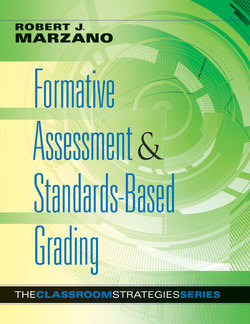Formative Assessment & Standards-Based Grading

Реклама. ООО «ЛитРес», ИНН: 7719571260.
Оглавление
Robert J Marzano. Formative Assessment & Standards-Based Grading
Отрывок из книги
Assessment &
THE CLASSROOM STRATEGIES SERIES
.....
A scrutiny of the studies reported in table 1.5 provides a number of useful generalizations about learning goals and, by extrapolation, about learning progressions. First, setting goals appears to have a notable effect on student achievement in its own right. This is evidenced by the substantial ESs reported in table 1.5 for the general effects of goal setting. For example, Kevin Wise and James Okey (1983) reported an ES of 1.37, Mark Lipsey and David Wilson (1993) reported an ES of 0.55, and Herbert Walberg (1999) reported an ES of 0.40. Second, specific goals have more of an impact than do general goals. Witness Mark Tubbs’s (1986) ES of 0.50 associated with setting specific goals as opposed to general goals. Edwin Locke and Gary Latham (1990) reported ESs that range from 0.42 to 0.82 regarding specific versus general goals, and Steve Graham and Dolores Perin (2007) reported an ES of 0.70 (for translations of ESs into percentile gains, see appendix B). Third, goals must be at the right level of difficulty for maximum effect on student achievement. This is evidenced in the findings reported by Tubbs (1986), Anthony Mento, Robert Steel, and Ronald Karren (1987), Locke and Latham (1990), Kluger and DeNisi (1996), and Matthew Burns (2004). Specifically, goals must be challenging enough to interest students but not so difficult as to frustrate them (for a detailed discussion of learning goals, see Marzano, 2009).
The Imprecision of Assessments
.....